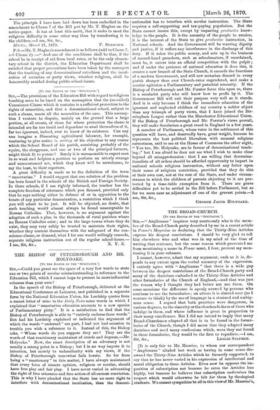[TO THE EDITOR OF THE "SPECTATOR."] SIE,—The provisions of the
Education Bill with regard to religious teaching seem to be based on the assumption that the (so-called) Conscience-Clause which it contains is a sufficient protection to the rights of minorities, and that a denominational school, subject to such a clause, meets all the necessities of the case. This assump- tion I venture to dispute, mainly on the ground that a large portion, at all events, of those for whose protection the clause is intended are far too timid and dependent to avail themselves of it, far too ignorant, indeed, ever to know of its existence. Can any one imagine a Dissenting agricultural labourer, for example, venturing to give notice in writing of his objection to any course which the School Board of his parish, consisting probably of the squire, the clergyman, and one or two of the principal farmers, might think fit to pursue? Surely it is unreasonable to expect men in so weak and helpless a position to perform an utterly strange and unaccustomed act, which they know will be unwelcome, to say the least, to their superiors.
A great difficulty is made as to the definition of the term " unsectarian." I would suggest that one solution of the problem has been found in the schools of the British and Foreign Society. In these schools, if I am rightly informed, the teacher has the complete freedom of utterance which you demand, provided only that he says nothing either in defence of or in opposition to the tenets of any particular denomination, a restriction which I think you will admit to be just. It will be objected, no doubt, that such teaching would almost always be found unacceptable to Roman Catholics. That, however, is no argument against the adoption of such a plan in the thousands of rural parishes where no Roman Catholics exist ; and in the large towns where they do exist, they may very safely be trusted to maintain their rights, whether they content themselves with the safeguard of the con- science-clause, or demand, what I for one would willingly concede, separate religious instruction out of the regular school-hours.—


































 Previous page
Previous page